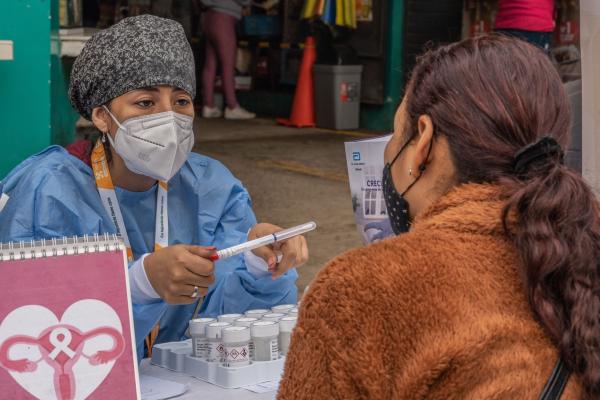Every February 4, the World Cancer Day is commemorated, this initiative promoted by the World Health Organization (WHO), the International Union Against Cancer (UICC) and the International Agency for Research on Cancer (IARC) that aims to raise awareness of the importance of early detection for the initiation of timely treatment to advance in the prevention and control of this disease.
According to the World Health Organization (WHO) out of 500 000 women who received a diagnosis of cervical cancer globally, 54.98% of them died due to lack of access to treatment and late arrest. Added to this is the stigma and fear that women suffer when faced with molecular testing for the detection of Human Papillomavirus (HPV), a barrier that directly impacts diagnosis, follow-up and timely treatment.
In Peru, cervical cancer is the leading cause of death in women of reproductive age and the second most common cancer in women. In 2021, 4270 women were reported diagnosed with cervical cancer and 2288 women die annually as a result of this disease.
Active search for women at risk of developing cancer
Faced with this situation, the Non-Communicable Diseases Program of Socios En Salud and the Cancer Prevention and Control strategy of the Integrated Health Network Directorates (DIRIS) of North and East Lima launched the DETECCTATE community strategy that sought to strengthen the early detection of cervical cancer and contributed to the reduction of morbimortality in women aged 30 to 49 years in North and East Lima.
Free health campaigns organized by Socios En Salud (SES) and the Cancer Prevention and Control strategy of DIRIS Lima Norte and Este for cervical cancer prevention in Rimac. Photo by Monica Mendoza / PIH
Thanks to the coordinated work between the Ministry of Health and Socios En Salud through this community intervention allowed education, guidance, access and diagnosis through molecular testing of the Human Papilloma Virus (HPV) that causes cervical cancer in women from 10 health centers in North Lima and East Lima. Thus:
- 2144 women received education and counseling on cervical cancer. 93% of them, never had an HPV molecular test for cervical cancer.
- 1460 women were connected to the health facility in their jurisdiction for HPV molecular testing.
- Of these, 215 tested positive for Human Papillomavirus (HPV).
- 1031 women were accompanied by community health agents for clinical examinations: molecular tests, colposcopies, biopsies, cauterizations, chemotherapies, among others.
“Periodic preventive checkups are the best allies for the timely detection of cervical cancer that will allow early treatment and thus save the lives of thousands of people.”
- Noris Hernández, coordinator of the DETECCTATE Project of the Non-Communicable Diseases Program
From Socios En Salud we are committed to strengthening access to screening, diagnosis and referral in primary health care services to initiate timely treatment. No woman should die from cervical cancer.
News
.
